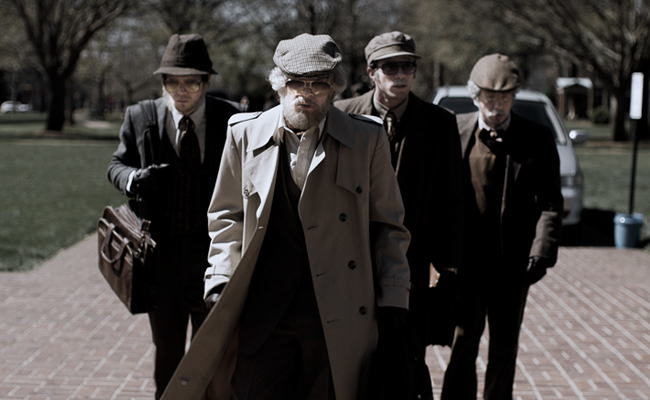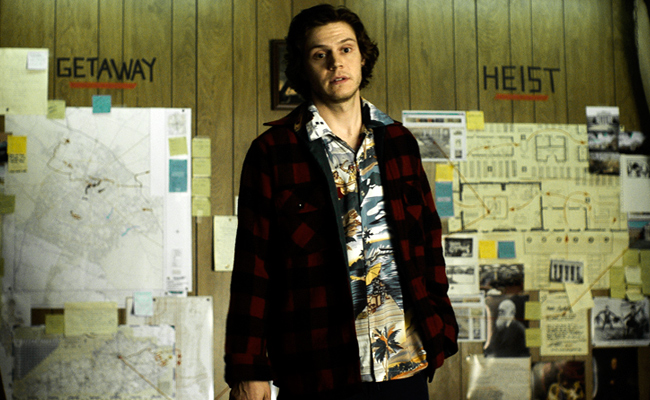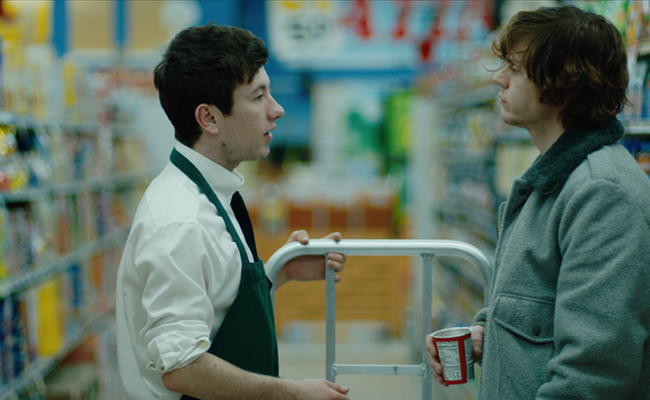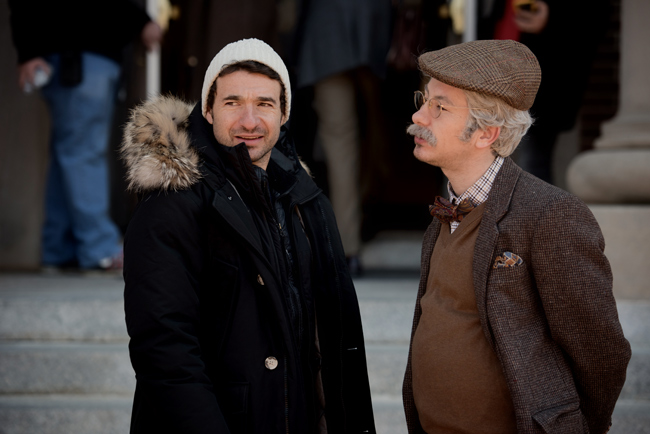
American Animals, opening this week, isn’t just a new movie, but a new kind of movie. Written and directed by Bart Layton, whose 2012 documentary The Imposter garnered near-universal acclaim and seemed to set a new standard for visual composition in documentary filmmaking, American Animals is Layton’s non-documentary debut feature.
I use “non-documentary” carefully, because while in many ways American Animals is a traditional heist movie, “fiction” isn’t quite right. Where I, Tonya depicted its characters occasionally looking into the camera to say “this never happened,” as a way to convey the disputed nature of some of the events the movie depicts (giving itself license to depict the juicier parts, even if they may not have happened), American Animals does them one better. Layton’s film uses the real people being played by the actors, sometimes in traditional talking-head interview form, other times sharing scenes and dialogue with the actors playing them. And in this case it’s not just to be post-modern or bend genres, it seems to be an honest attempt to reclaim the true meaning of “this is a true story” or “based on a true story.”
So many movies, from horror movies about ghosts and demonic possession to more traditional biopic-style prestige movies like The Post or Argo, have stretched the idea of the true story to the point that the label has become almost meaningless. Some films, from I, Tonya to Selma, have occasionally flirted with mixing stock footage and research with traditional fictional film techniques. But American Animals feels like the first movie maybe since American Splendor to mix the two in novel ways. And in this case, to do so with the purpose of actually exploring what truth is.
“I certainly feel like audiences now are so sophisticated and literate and understand what the game is in terms of how stories get fictionalized,” Layton told Uproxx. “I think there were a lot of people who read the script and go, ‘Why are you throwing me out of the movie?’ [with the interviews] ‘I’m just in with these characters. Leave me in there.’
“And I’d be like, ‘Yeah, but that’s the whole point.’ I want you to be thrown out of the movie momentarily. I want you to be constantly grabbed by the lapels and shaken and going, ‘Don’t forget this is a true story.’ You should have more skin in the game. You should feel more connected, and more worried about the outcome because it’s real rather than, ‘Oh, it doesn’t affect me. It’s a movie, it’s a bunch of actors.'”

In this search for truth, American Animals‘ form fits its subject matter. It tells the story of Warren Lipka and Spencer Reinhard, two Kentucky college students (played by Evan Peters and Barry Keoghan) searching for something, anything to make their lives feel in any way special. Seemingly inspired solely by boredom, they enlist a few similarly upwardly mobile white college student buddies to steal a valuable rare book from their university’s library. They watch their favorite heist movies over and over to prepare, and in so doing, seem to get lost in the fantasy of it all.
“I started writing to them in prison,” Layton says. “If you come from docs, that’s what you do. You don’t just buy the article option. You go straight to the horse’s mouth. And then they wrote these very surprisingly honest letters about the need for an experience of life, especially Spencer, the artist [played by Keoghan]. Dreaming of being an artist and feeling like he didn’t have anything worthy of making art about. He’d never had any kind of suffering in his life. And I thought what an interesting starting point for a film and for a protagonist, someone whose only real problem is he hasn’t got a problem.”
Throughout, Layton uses the real people and places to underline the story, giving real stakes to the goofy fun that heist movies usually are. He turns American Animals into a stomach-churning exercise in escalating tension as we watch the characters talk themselves into making a grave mistake. It comes as no surprise to learn that Layton was an executive producer on the equally quease-inducing National Geographic series Locked Up Abroad, in which the subjects recount whatever dumb thing they did that got them jailed in a foreign country.
“That was very gratifying watching the movie with hundreds of people and they’re all slumped down in their seats, and they’re watching it through their hands,” Layton says. “One woman after a screening complained that the experience had been too suspenseful. I was like, ‘Sorry.'”

If the obvious question when watching a film like American Animals mix Hollywood filmmaking and documentary is, “why hadn’t anyone done this sooner,” the equally obvious answer is “because it’s much harder.”
To get a film like this made requires a filmmaker who really wants to do it for artistic reasons, and isn’t put off by all the roadblocks, both commercial and logistical, pushing them in another direction.
“I think people have avoided it because I think often with movies that are based on a true story, people want to take a lot of artistic license,” Layton says. “Most true stories do not conform to what a Hollywood screenplay requires. So I think part of the reason people avoid that is so that they can take much more artistic license. They can fictionalize it and make it less true. I think the value of including the truth and the real guys, and all the rest of it, is that you buy into it in different ways. Your investment in it is heightened because you know it’s true.”

With the explosion in popularity of true crime podcasts, multi-part documentary series on Netflix, and films themselves that have blurred the line between Hollywood screenwriting and documentary, the public is primed for a more innovative mix of documentary and recreation like American Animals presents. You don’t have to wait until the end of it for the now standard side-by-side photographs of the real people and the actors who played them. It feels incredibly timely. Yet Layton claims the thought never occurred to him.
“I don’t tend to worry too much about how things are categorized,” Layton says. “It’s more like, ‘Is this best way of telling this particular story?’ And honestly, it was sort of something I wanted to get out of my system. This idea that what is the other way of telling a true story that’s not that thing that we’ve become so familiar with. I never think like, ‘This will be zeitgeist-y.’ You just hope that you are plugging into something that feels relevant.”
American Animals hits select theaters this Friday.






